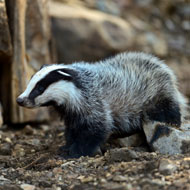
Extended following controversial pilot tests
The badger cull has been rolled out to Dorset as part of new plans to help tackle bovine TB, the Government has announced.
The announcement follows controversial pilots in Somerset and Gloucestershire which have been running for the past two years.
Licenses have been granted to allow six weeks of continuous culling in the three counties until the end of January.
The decision has been widely criticised by animal rights campaigners who say the cull is inhumane and ineffective. In Somerset, the 2013 targets were missed, and were only just reached in 2014.
Defending the decision, George Eustice, minister of state for farming, said: "England has the highest incidence of TB in Europe and that is why we are taking strong action to deliver our 25-year strategy to eradicate the disease and protect the future of our dairy and beef industries.
"This includes strengthening cattle testing and movement controls, vaccinating badgers in the buffer zone around high-risk areas, and culling badgers where the disease is rife.
"Our approach of dealing with the disease in cattle and wildlife has worked overseas and is supported by leading vets."
Although the BVA has supported the culls in the past, they recently criticised the methods used, saying that they are neither humane or effective. They recommended that badgers should be trapped and shot, instead of killed through "controlled shooting" in the wild.
BVA president John Blackwell said: "As part of the comprehensive strategy to tackle bovine TB, BVA has called for the wider roll out of targeted and humane badger culling using cage trapping and shooting only.
"Given that the first two years of culling in the pilot areas failed to demonstrate conclusively that controlled shooting could be carried out effectively or humanely based on the criteria that were set, we made it clear that we could no longer support the use of controlled shooting for badger control.
"We are therefore disappointed that controlled shooting will be used in Dorset as well as Gloucestershire and Somerset, and reiterate our call for the tried and tested method of cage trapping and shooting only to be used in order to ensure a safe, effective and humane cull.”
As part of the new plans to tackle Bovine TB, Defra have announced that it will consult on the following proposals:
• Introducing compulsory testing for all cattle entering low-risk areas, such as the north and east of England
• Changes to the criteria for future badger control licences such as reducing the minimum area for a licence
• Controlling TB in non-bovine animals such as pigs, goats, and deer.
Welcoming the news, BVA president John Blackwell added: “BVA has always argued that to control and eradicate bovine TB we need a comprehensive suite of measures that tackles all sources of infection.
"In particular we welcome any proposals to extend and strengthen the tools we use to tackle bovine TB, such as improved surveillance and further cattle controls to halt the spread of TB northwards and eastwards. We also support greater attention being given to how the disease is spreading into non-bovines, such as pigs, goats and deer.
“On changes to the criteria for future badger control we will need to fully consider the evidence base for reducing the minimum area for a licence, given that the current criteria build on the Randomised Badger Culling Trial.
“We will consult our members on all of the proposed measures and continue to work with farmers and the government to control and eradicate bovine TB.”



 The Veterinary Medicines Directorate (VMD) is inviting applications from veterinary students to attend a one-week extramural studies (EMS) placement in July 2026.
The Veterinary Medicines Directorate (VMD) is inviting applications from veterinary students to attend a one-week extramural studies (EMS) placement in July 2026.